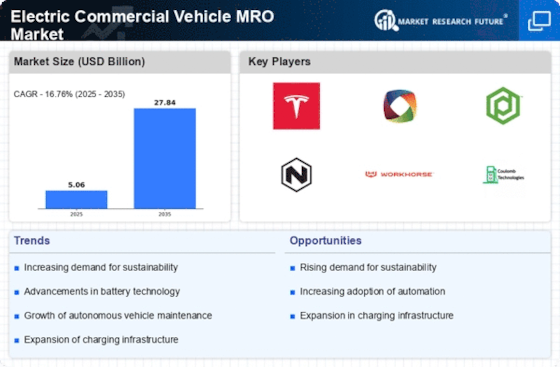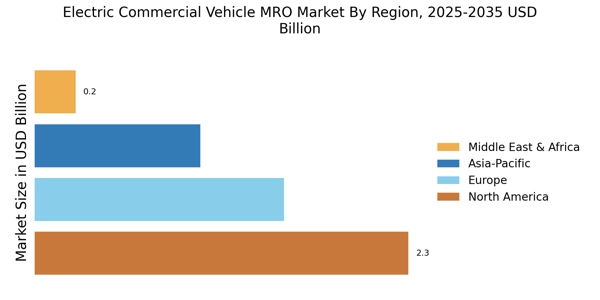Government Incentives and Support
Government incentives and support play a crucial role in driving the Electric Commercial Vehicle MRO Market. Various governments are implementing policies to promote the adoption of electric vehicles, including tax credits, grants, and subsidies for both consumers and businesses. These initiatives not only encourage the purchase of electric commercial vehicles but also stimulate the need for comprehensive MRO services. For example, in some regions, incentives have led to a 30% increase in electric vehicle registrations within a year. As more electric commercial vehicles hit the roads, the demand for specialized maintenance and repair services will likely rise, further propelling the Electric Commercial Vehicle MRO Market.
Growing Environmental Regulations
Growing environmental regulations are significantly influencing the Electric Commercial Vehicle MRO Market. As governments worldwide implement stricter emissions standards, businesses are increasingly compelled to transition to electric commercial vehicles. This shift not only helps in compliance with regulations but also enhances corporate sustainability profiles. The market for electric commercial vehicles is projected to grow at a compound annual growth rate (CAGR) of 20% over the next five years, driven by these regulatory pressures. Consequently, the Electric Commercial Vehicle MRO Market must evolve to meet the specific maintenance needs of these vehicles, ensuring they operate efficiently and in compliance with environmental standards.
Advancements in Battery Technology
Advancements in battery technology are transforming the Electric Commercial Vehicle MRO Market. Enhanced battery performance, including increased energy density and reduced charging times, is making electric commercial vehicles more appealing to fleet operators. As battery technology continues to evolve, the need for specialized maintenance and repair services will grow. For instance, the lifespan of lithium-ion batteries is improving, with many now lasting over 1,000 charge cycles. This longevity requires a different approach to MRO, focusing on battery health monitoring and management. The Electric Commercial Vehicle MRO Market must adapt to these technological changes, ensuring that service providers are equipped to handle the complexities of modern electric vehicle maintenance.
Rising Demand for Electric Vehicles
The increasing demand for electric vehicles (EVs) is a primary driver for the Electric Commercial Vehicle MRO Market. As businesses and consumers alike shift towards sustainable transportation solutions, the market for electric commercial vehicles is projected to grow significantly. According to recent data, the sales of electric commercial vehicles are expected to reach 1.5 million units by 2025. This surge in demand necessitates a robust maintenance, repair, and operations (MRO) framework to ensure the longevity and efficiency of these vehicles. Consequently, the Electric Commercial Vehicle MRO Market is likely to expand in tandem with the rising fleet of electric commercial vehicles, creating opportunities for service providers and manufacturers alike.
Increased Focus on Fleet Electrification
The increased focus on fleet electrification is a significant driver for the Electric Commercial Vehicle MRO Market. Many companies are recognizing the operational and cost benefits of transitioning their fleets to electric vehicles. This trend is expected to lead to a substantial increase in the number of electric commercial vehicles in operation, with estimates suggesting that fleets could comprise up to 50% electric vehicles by 2030. As fleets electrify, the demand for specialized MRO services tailored to electric vehicles will likely surge. The Electric Commercial Vehicle MRO Market must prepare for this shift by developing expertise in electric vehicle maintenance and repair, ensuring that service providers can meet the evolving needs of electrified fleets.


















Leave a Comment